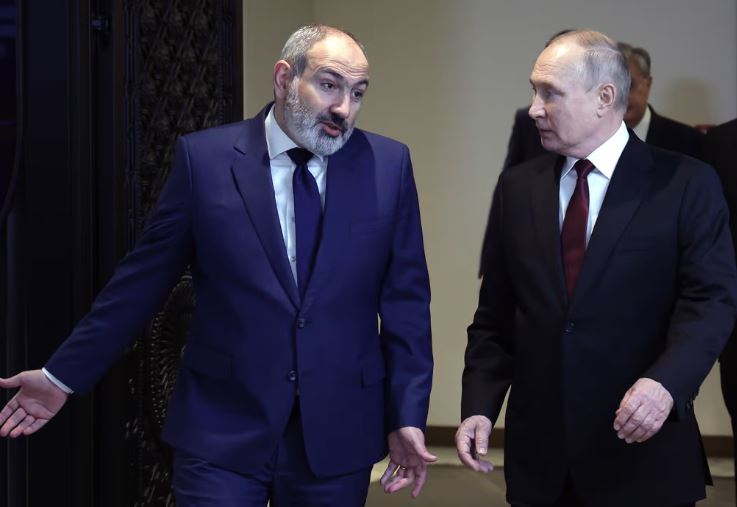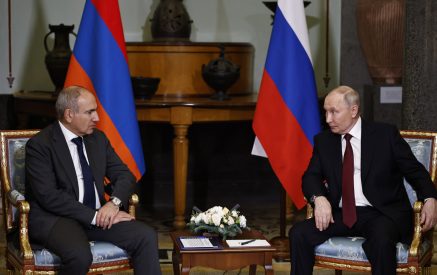A summit of former Soviet states was supposed to project Moscow’s power. Instead, it showed the Kremlin’s regional influence is crumbling.
A small group of demonstrators lined the road from the airport on Wednesday afternoon to celebrate Russian President Vladimir Putin’s arrival in Armenia. “Welcome,” a banner hung over the barriers read, “we will be together forever.”
Read also
Across Yerevan, in the capital’s central square, the message was very different. “We want to get out from Russia’s shadow,” 47-year-old office worker Lilit shouted, her voice almost drowned out by an activist with a megaphone. “The world is being divided, and our future has to be with the West, not with the dictators.”
She was one of hundreds who turned out to protest Putin’s rare trip abroad for a crunch summit with leaders of the half dozen former Soviet states that are members of the Moscow-led Collective Security Treaty Organization (CSTO). As well as Russia, the military pact in principle ties Armenia, Belarus, Kazakhstan, Kyrgyzstan and Tajikistan into a mutual defense agreement that replaced the shared Red Army of the USSR.
In recent months, though, the cracks have started to show.
“We see problems with the work of the CSTO,” Putin told his partners at a secure conference center in Yerevan, “but still it is obvious that it helps to protect the national interests, sovereignty and independence of our countries.”
Not everyone sees it the same way. “The CSTO is Russia’s way of preserving its sphere of influence in the former Soviet Union,” said Natasha Kuhrt, senior lecturer in international peace and security at King’s College London. “But in reality, it’s a paper tiger — it’s just not fit for purpose. It’s shown in the past it’s not prepared to intervene when its members call for support, and Putin’s fellow leaders are deeply concerned by the poor performance of his armed forces in Ukraine when they had previously relied on Moscow as the guarantor of their security.”
For the hosts of Wednesday’s summit, that’s a problem they know all too well. In September, Armenian Prime Minister Nikol Pashinyan formally lodged a request with the CSTO to step in after towns and villages throughout the country came under bombardment from across the border with neighboring Azerbaijan. However, already forced to call up conscripts to help fight its increasingly catastrophic war in Ukraine, the Kremlin appeared unable or unwilling to follow through, agreeing to dispatch a contingent of observers to the border instead. Protesters took to the streets of Yerevan in the wake of the decision, calling for Armenia’s withdrawal from the bloc.
Likewise, the organization’s unity was tested by a bloody border conflict between Tajikistan and Kyrgyzstan in September that saw more than 140 soldiers killed. In the wake of the firefights, Kyrgyzstan pulled out of the military drills — named Indestructible Brotherhood — that had been scheduled for the following month.
At the same time, Belarusian strongman Alexander Lukashenko agreed to requests from the Kremlin for his country to be used as a launchpad for rocket and ground attacks on Ukraine, but has so far avoided committing his own forces to the so-called special operation. On Wednesday, though, he acknowledged that the future of the CSTO depends on the success of Russia’s war, while still committing to do little himself to help it along.
Meanwhile, after Kazakh President Kassym-Jomart Tokayev publicly snubbed Putin earlier this year by refusing to acknowledge Russian sovereignty over Donbass, Moscow’s state media has turned the same ire on his country as it has on Kyiv. “Kazakhstan is the next problem because the same Nazi processes can start there as they have in Ukraine,” commentator Dmitry Drobnitsky warned on Russia’s First Channel this week.
Sitting alongside his counterparts at the summit, Putin was keen to achieve consensus on uncontroversial issues like Afghanistan, offering to help equip CSTO states with modern weapons. “My dear colleagues,” he added, “I will present information on Ukraine separately.”
“For Putin, the Cold War — Russia standing against an ‘imperial’ West — clearly influences his thinking, and he sees CSTO states as younger brothers in that same struggle, joined by their shared history,” said Sergey Radchenko, a historian at Johns Hopkins School of Advanced International Studies. “But the relationship is starkly different now. The Soviet Union could order its allies around — Putin can’t order anyone, he has to woo his partners, and hope they either support him or stay out of things with some sense of benevolent neutrality.”
Distracted by its war in Ukraine and failing to keep even its closest allies in line, the Kremlin could hope for little concrete support at Wednesday’s summit. For many locals, even those born in the glory days of the Soviet Union that Putin longs to recreate, the idea that he is leading a coalition against Western aggression just doesn’t ring true.
“Putin is persona non grata,” said Vartes, 64, who joined the crowd in Yerevan. “Armenia is independent. We have elected our own government. We have nothing in common with this group of non-democratic states.”























































